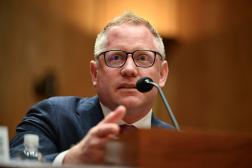Top Women in Cybersecurity: Bobbie Stempfley

Bobbie Stempfley, Director Cyber Strategy Implementation, The MITRE Corporation
We live in an information age, yet collaboration and information sharing in information security still proves difficult. Bobbie Stempfley, director of cyber strategy implementation at the MITRE Corporation is busy trying to erase that difficulty, working within government and the private sector to make sure the technology, operating concepts and the policies all align.
Can you talk about the biggest challenge you’ve faced in your career? How did you conquer that challenge?
 I’ve worked at really great places my whole career. But I’ve had to fight to have a voice in the discussion. It’s happened over and over again. In many places, I still had to make clear that I wasn’t there to type or make coffee. I’ve learned to persevere and be stubborn, and not judge people too harshly when they make a mistake.
I’ve worked at really great places my whole career. But I’ve had to fight to have a voice in the discussion. It’s happened over and over again. In many places, I still had to make clear that I wasn’t there to type or make coffee. I’ve learned to persevere and be stubborn, and not judge people too harshly when they make a mistake.
In terms of mission challenges, I’ve generally taken on jobs where an organization may be underperforming. I enjoy helping teams see their true potential and build foundations to execute on it. I came to MITRE because transformation is the nature of cybersecurity. The opportunity to improve the technology that we use every day and apply it to government services is huge. There is so much potential in the U.S. government’s ability to improve its delivery of services by helping agencies find opportunities to function as a single enterprise. FFRDCs are vital to helping the government in this area, and so that’s why I’m here.
Who inspired you to get into your field of work?
My grandmother was a really inspiring woman. She raised four children, and was a leader at Marsh McKinnen, a time when there weren’t a lot of women in the workforce. She was a crypto analyst during World War II, and was a member of the Navy’s Women Accepted for Volunteer Emergency Service (WAVES), working at what is now the Department of Homeland Security headquarters. She worked on breaking Japanese submarine encryption.
I was also inspired by my mother, who started out as a secretary went on to get her bachelor’s and master’s degrees, and became a federal comptroller. And my dad, who taught me that it’s okay to make my own mistakes, but strive to learn from the mistakes of others. I always had great fun asking questions and solving problems, so engineering seemed like my most interesting option.
Why is it important to you to empower women and other minorities to join more technical and technology-related fields?
The best ideas come when we bring together lots of people who think differently. My best working relationships are with bosses or deputies who approach problems differently than I do. This diversity of thought in the solution space is critical to solving the really complex problems that we have.
We work hard at MITRE to empower women and underrepresented minorities. And we have a real culture of questioning each other’s assumptions. It’s not just about saying that we’re committed to diversity.
I work closely with the Cyber Diversity Foundation to bring more women and underrepresented minorities into the STEM workforce – and cyber in particular. Getting more talent into the industry is vital and encouraging people to pursue these careers. Sometimes it’s about recognizing that they can contribute in areas. We need computer scientists. But we also need behavioral and cognitive scientists who understand how humans use technology.






